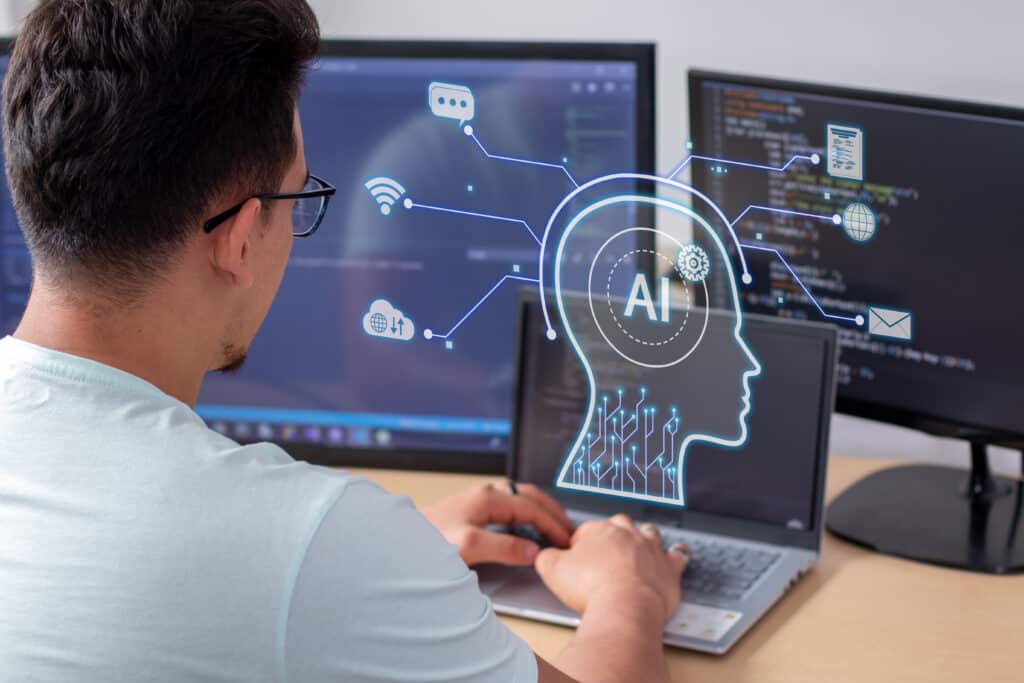The hype is real – AI is transforming every industry, promising efficiency, insights, and a competitive edge. But before you jump headfirst into the algorithmic abyss, let’s peel back the curtain and reveal the truth about implementing AI for business processes.
1. Beyond Automation: The Rise of Hyper-personalization:
Sure, chatbots can handle FAQs, but the future of AI lies in hyper-personalization. Imagine AI tailoring experiences to individual customers, from product recommendations that feel eerily like mind-reading to customer service that anticipates needs before they’re spoken. Businesses like Netflix and Spotify are already leading the charge, using AI to curate content that keeps users glued to their screens.
Businesses must understand their customers’ needs and provide them with relevant offerings. AI-powered chatbots have been instrumental in helping companies to optimize their customer experience. Chatbots can answer simple questions, direct customers to the correct department, and even process requests. As these chatbots get smarter, they can also provide personalized recommendations and increase sales. These bots can learn from customer interactions, improving them over time.

2. Predictive Powerhouse: From Forecasting to Prescribing:
Forget crystal balls; AI is the new seer. AI can predict customer behavior, market trends, and even equipment failures by analyzing vast data sets. Predictive analytics helps businesses to harness this data to make more informed decisions. Companies can mine vast amounts of data using AI tools for insights that may otherwise go unnoticed. Imagine airlines optimizing flight schedules based on real-time demand, manufacturers predicting machine breakdowns before they happen, and retailers anticipating seasonal fluctuations with pinpoint accuracy. AI can uncover patterns and trends that are not easily seen, which can be used to predict future events. Predictive analytics is helpful in various areas, like reducing wastage, forecasting inventory, optimizing supply chains, and identifying market trends. This prescriptive power lets businesses proactively adjust, mitigate risks, and optimize every move.
Another way the prescriptive power of AI can help is by optimizing your cybersecurity strategy. Data breaches have become commonplace as more businesses store sensitive data online. AI can be used to enhance cybersecurity strategies. It can monitor inbound and outbound network traffic to detect suspicious behavior or anomalies that human analysts may miss. AI tools can also be used to analyze logs of previous attacks and identify patterns that help to improve security policies.
3. The Democratization of Data: AI for Everyone:
Forget expensive data scientists and complex algorithms. The future of AI is accessible, user-friendly, and empowers every employee to leverage its power. Imagine drag-and-drop interfaces that let marketing teams build targeted campaigns without coding and sales reps using AI-powered insights to close deals with laser-sharp precision. This democratization will break down barriers and unleash the full potential of AI across all levels of an organization.
4. The Human-AI Tango: Collaboration, Not Replacement:
The fear of robots stealing jobs is authentic, but the truth is humans and AI make a formidable team. Imagine AI handling repetitive tasks, freeing up human creativity and critical thinking for higher-level work. Think of surgeons using AI-assisted robots for delicate procedures or designers wielding AI tools to explore uncharted creative territories. The future is about collaboration, not replacement, and businesses that embrace this synergy will thrive.
Another example would be recruiting the right candidate for a job, which is time-consuming and expensive. AI can significantly reduce the time and expenditure involved in this process. AI-powered tools can screen resumes and cover letters, prioritize candidates, and conduct initial interviews, saving a lot of time for the human recruiters involved and helping to identify the most suitable candidates for a given job.
5. The Ethical Imperative: AI with a Conscience:
As AI becomes more powerful, questions of bias, transparency, and accountability loom large. The future of AI is responsible, ethical, and mindful of its impact on society. Imagine AI algorithms trained on diverse datasets to avoid bias and businesses building trust by being transparent about how they use AI. This ethical imperative is not just a moral obligation, it’s also a smart business decision, as consumers increasingly demand products and services built with responsible AI in mind.
The truth about implementing AI? It’s not a magic bullet but a powerful tool that requires careful planning, collaboration, and an unwavering commitment to ethics. Businesses that embrace these trends, empower their employees, and act with responsibility will unlock the true potential of AI and transform their processes for the better.
